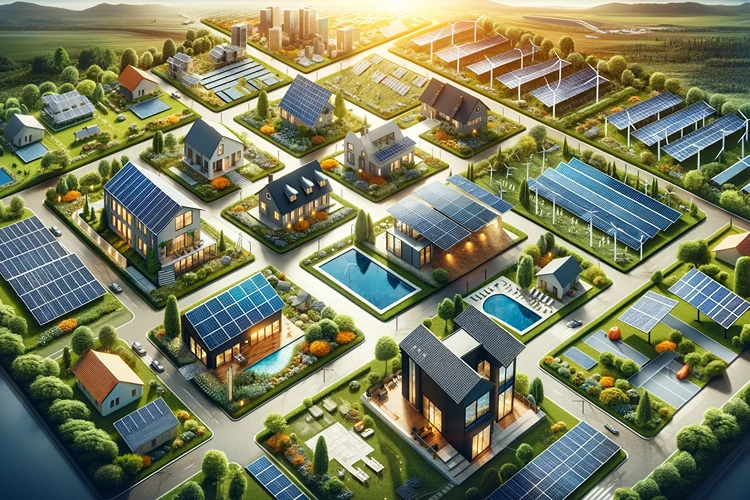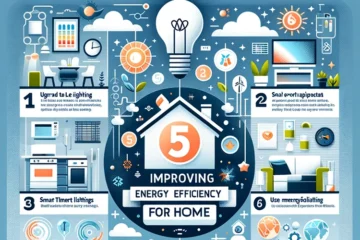Guide to Solar Panels: Installation, Costs, and Benefits

Thinking about reducing your carbon footprint while slashing your electricity bills? Solar panels offer a green, cost-effective way to power your home. But what goes into installing them, how much do they cost, and what benefits can you expect? Let’s dive into the world of solar energy and uncover how it can light up your life.
Why Solar Energy?
Solar energy is not just about embracing technology. It’s a commitment to a sustainable future. With solar panels, you’re not just cutting down on utility bills; you’re part of a global movement towards renewable energy. This section explores the compelling reasons to consider solar energy for your home.
Understanding Solar Panel Technology
Before considering solar panels, it’s crucial to grasp how they work. Solar panels convert sunlight into electricity through photovoltaic cells. This section will simplify the science behind solar technology, making it easy to understand how your home can harness the power of the sun.
Helpful Hint:
When evaluating solar panels, consider their efficiency ratings. Higher efficiency means more electricity generation per square foot, crucial for maximizing output in limited spaces.
Assessing Your Solar Potential
Not every home is ideally situated for solar energy. Factors like location, roof orientation, and shading affect your solar potential. This section offers insights on how to assess your home’s suitability for solar panels, ensuring you make an informed decision.
Stats:
A study found that homes with solar panels sell 20% faster and for 17% more money than those without. Solar panels are not just an energy-saving upgrade but a valuable investment in your property.
Solar Panel Installation Process
Installing solar panels is a multi-step process, from site assessment to installation and grid connection. This section will walk you through each step, providing a clear understanding of what to expect when you decide to go solar.
Breaking Down the Costs of Solar Panels
The cost of solar panels has plummeted over the past decade, making it more accessible than ever. However, upfront costs can still be significant. This section breaks down the average costs associated with purchasing and installing solar panels, including potential hidden fees and how to budget for your solar project.
Financing Your Solar Panels
Fortunately, various financing options are available to homeowners looking to invest in solar energy. From solar leases to loans and government incentives, this section explores the most common financing methods, helping you find a solution that fits your financial situation.
Helpful Hint:
Investigate local and federal tax incentives for solar panel installation. These can significantly reduce the net cost, making solar energy more affordable than you might think.
The Long-Term Benefits of Solar Energy

Solar panels are more than just an environmental statement; they’re a smart long-term investment. This section delves into the myriad benefits of solar energy, from reducing your carbon footprint to enjoying virtually free electricity once the panels pay for themselves. We’ll also explore the increasing value solar panels add to your property.
Maintenance and Upkeep of Solar Panels
Concerned about the long-term upkeep of solar panels? This section addresses common maintenance questions, offering tips on keeping your solar panels in top condition to ensure maximum efficiency over the years.
Stats:
On average, solar panels have a lifespan of 25-30 years, with many systems continuing to operate efficiently well beyond this period, making them a durable investment in your home’s future.
Maximizing the Efficiency of Your Solar Panel System
To get the most out of your solar investment, optimizing system efficiency is key. This section covers strategic placement, the importance of professional installation, and how to monitor your system’s performance to ensure you’re harnessing as much solar power as possible.
FAQs
Investing in solar panels is not just an environmentally conscious decision but a financially smart one. With the costs of solar installations decreasing and the myriad of benefits they offer, there’s never been a better time to consider making the switch to solar energy. From significant savings on electricity bills to increasing your home’s value and contributing to a greener planet, the advantages of solar panels shine brightly.
Remember, every solar journey begins with a single step. By understanding the installation process, costs, and benefits, you’re well on your way to harnessing the sun’s power and making a lasting impact on both your wallet and the world.
This comprehensive guide aims to provide all the information you need to make an informed decision about solar energy. By embracing solar panels, you’re not just installing a power system; you’re investing in a sustainable future for your home and the planet.
Additional Resources:
- National Renewable Energy Laboratory (NREL): Visit nrel.gov for cutting-edge information on solar technology advancements and renewable energy research. NREL provides comprehensive data, tools, and publications to help consumers and professionals understand the current landscape of renewable energy.
- Energy Star: Check out energystar.gov for guidelines on energy-efficient products and practices. Energy Star offers resources for homeowners looking to enhance their home’s energy efficiency with solar panels and other energy-saving solutions.


